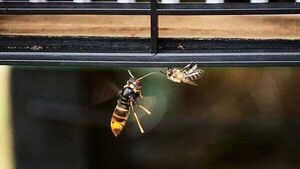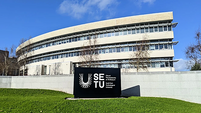Ireland still only has one confirmed Asian Hornets nest, NPWS insists

Olivia Kelleher
Ireland currently has only one confirmed nest of Asian hornets, with the National Parks and Wildlife Service (NPWS) investigating a small number of potential individual sightings, according to the chair of the Asian Hornet Management Group, Áinle Ní Bhriain.
Ms Ní Bhriain told the Neil Prendeville show on Cork’s Red FM that, contrary to press reports, there is no confirmation or evidence of any other nests in Ireland other than the one that was detected last month.
“The one confirmed nest in Cork is being dealt with over the next few days. Our operational window is opening today. Obviously, it is weather-dependent, but we would hope to have that all removed and dealt with in the next 48 hours or so.
"The other sightings — absolutely, we are following up on every single sighting, but we have no evidence that there is any other nest as such. A nest would be a much bigger thing. There has been sightings, and the NPWS is following up on every single one," Ms Ní Briain said.
"The National Museum are going to do some DNA testing and then we can confirm that the hornets come from the same nest. It is quite technical, and we will be doing a whole battery of tests on it.”
Ms Ní Bhriain also spoke of the importance of recovering the confirmed nest intact as opposed to destroying it.
“There is so much we can learn from it. Like, how did they get here? What stage of development is the nest at? At the moment, we think that they are still only building the nes,t but there is a lot of stuff that we can learn from this first nest that will help us for future encounters.
"We will be better prepared and will have more information, and we can infer how it got in and all of that. Destroying it tells us nothing.”
She said that once the nest in Cork is removed from the confirmed site, they will continue monitoring the area to “catch any stragglers.”
“If you remove the nest, they will return to the nest site, and they will start rebuilding. Once we remove the nest, we will continue the monitoring on that site to catch any of the stragglers who aren’t in when we come to remove the rest.”
Ms Ní Bhriain added that an expert is travelling from the UK to “monitor and mentor” the process of taking the nest down.
“We are learning our lesson from the Continent. The best advice is to get ahead of it, and that is why we have reacted so quickly to this sighting.
"We are physically on site where the nest is, and we are dealing with that, and we are following up on the coastal sightings and like I said, every site is being followed up on. Three sightings is all that is down there, but we have to take it as seriously as we did the very first sighting.”
Ms Ní Bhriain, who is also the director of EU and International Affairs at the NPWS, is calling on members of the public to report any potential hornet sightings.
“We are encouraging people if they see what they think is a hornet to submit it to invasives.ie. If you can get a photograph, that would be great. We are getting lots and lots of photographs in. Most of them are not hornets, but it is just fantastic to see that public response.”
She said that Asian hornets are generally not a threat to the public.
“It is not generally dangerous, but you don’t know how people are going to react to it. So the best thing is to stay away. If you can photograph it safely, great, but otherwise don’t go near it.
"There is a reason why we have the expression ‘poking a hornet's nest’ that is basically our advice. Photograph it, report it to us and we will deal with it.”
Ms Ní Bhriain has warned that the Asian hornet poses a risk to native pollinators and biodiversity.
“There is gory footage online of a hornet going up to a bee and biting it in half. They feed on pollinators. If one hornet can get into a nest, it will just decimate the nest. It destroys and eats everything around it. It will attack all of our pollinators.
"I have even seen footage of it trying to have a go off a wasp. It is predatory. They are voracious. The level of damage they can do in a small amount of time is significant," she said.
However, she is urging members of the public not to set traps for hornets.
“I wouldn’t be recommending a trap at all because if you trap every insect, you will end up killing the very animal you are trying to protect. Leave it to us for the moment.”
The Asian Hornet was first identified in Europe in Lot-et-Garonne in south-west France in 2004. It was thought to have been imported in a consignment of pottery from China and quickly established and spread to many regions of France.
Since then, the Asian Hornet has now spread to and established in several EU countries. There are also ongoing control efforts in the UK to prevent this species from establishing there. A population of Asian hornets have also been recorded in the United States.
The NPWS, in partnership with the Northern Ireland Environment Agency and the National Biodiversity Data Centre, is working to address the threat posed by the Asian hornet.





